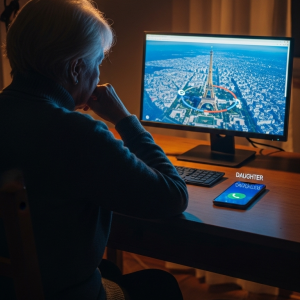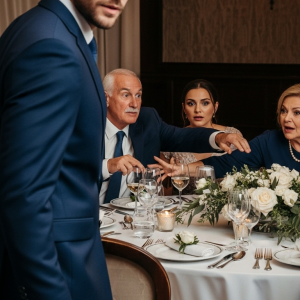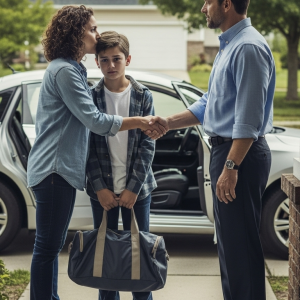My name is Linda Harper. I am 58 years old. Last month, after thirty years of raising my son—giving him every ounce of love, time, and sacrifice I had—he looked me in the eye and called me a parasite. That word still echoes in my head. I had just told him I’d left my job and wanted to come home to rest. He didn’t ask why. He didn’t ask if I was okay. Instead, he told me I was a burden. In that moment, something inside me broke. I had convinced myself that being a good mother meant always putting him first, but I realized he never saw me as his mother. He saw me as a resource. And so, I left.
Let me take you back. I met Brian when he was just a year old. I was volunteering at a child welfare center. He was a fragile baby with a congenital heart defect, abandoned in a dumpster. The moment his tiny, terrified eyes locked onto mine, something in my soul recognized him. At the time, I was married. My husband, Richard, wanted a biological child; I wanted to save Brian. He gave me an ultimatum: the baby or our marriage. I didn’t hesitate. I left Richard and raised Brian alone.
What followed were years of unrelenting sacrifice. I worked double shifts waiting tables, cleaned homes at night, and sold handmade crafts at local markets. To afford his education and the heart surgery that would save his life, I took a live-in job as a housekeeper for a wealthy widow, Catherine Blake. For years, I lived in her home, sending every spare penny to Brian. I missed his birthdays, his holidays, his graduation—all so he could have the life I never did.
He eventually met and married Diana. Her family, well-off and proud, always looked down on me. Diana’s mother, Carol, once told me to my face, “You’ve done enough. Let us raise him properly now.” Still, I swallowed my pride. I scraped together every penny I had to help them with the down payment on their house. I never put my name on the deed. I trusted them. I believed love was enough.
For years, I kept working for Catherine, kept sending them money so they wouldn’t have to struggle. Until the day I walked into that house, my body tired and worn, no longer able to continue. The day Brian called me a burden. The day the boy I chose over everything else told me I was no longer useful.
I had just come home from my last day with Catherine. It was a difficult goodbye; she had become like family. But I was 58, and I was tired. I wanted to finally rest. I barely stepped through the door when Brian snapped. “You left that job? Are you serious?” he shouted. “That was eight thousand a month! What are you going to do now, sit around and freeload?” I stood there, stunned into silence. I tried to change the subject, mentioning their plans to start a family. “I thought I’d come back to help out, you know? Cook, clean…” Diana stared at me, her expression cold. “We’ll hire professionals,” she said dismissively. “Postpartum recovery requires trained care, not… whatever you used to do.”
Her mother, Carol, chimed in. “You can still contribute, though. We’ll need a night nurse, a nanny… those costs add up. You’ll handle those expenses, and I’ll manage the hiring.” Before I could process her words, Brian added, “She’s right, Mom. You never should have quit. Our expenses are about to double. We need your support now more than ever.” They didn’t want me. They wanted my income. “I’m 58,” I said quietly. “I think it’s time I rest.” Brian actually laughed. “Rest? You don’t even have a pension.” I reminded him that the money for my pension went to paying off their mortgage. Diana scoffed. “That was your mistake. You’re in great shape, you can still work another twenty years.” They expected me to work until I broke. That was the moment I saw it clearly: the love I thought they had for me was entirely transactional.
I packed my things that same night. There wasn’t much. As I walked to the door, Carol stopped me, a cruel smile on her face. “You can’t just leave. Where will you go? I actually know a wealthy family looking for a live-in assistant. Room and board included. You’ve done that kind of work before. It should be an easy transition.” Diana jumped in. “Perfect! And whatever you earn, you can use to help with our household expenses. It’s a win-win.” They had already planned my future: I would go back to being a maid so they could live comfortably. I looked them dead in the eye. “I already quit. I’m not going back.”
Carol’s face hardened. “Then maybe you should look into senior housing. There’s a facility nearby. They let people your age stay if they take on light duties—kitchen help, janitorial work.” “You’d be pulling your own weight,” Brian added. “Isn’t that the most dignified way to do it?” Dignity. As if mine only existed when it served their needs. Right in front of me, Brian pulled out his phone and started dialing the retirement facility. The child I’d rescued, the one I’d carried through sickness and fear, was trying to send me to a work-based shelter like I was a stray.
What he didn’t know was that I wasn’t broke. Far from it. Catherine Blake, the woman I had worked for all those years, had no children of her own. She had come to see me as the daughter she never had. In her will, she left her entire estate to the one person she trusted most: me. The paperwork had finalized just a week before I came home. Eight million dollars, transferred, legally irrevocable, and not a single soul in that house knew. They were about to find out that the price of betrayal was far more expensive than they could ever imagine.
A week later, I walked into a luxury real estate showroom. I was there to buy a home that would finally, truly be mine. A young assistant greeted me with a warm smile, but before we could begin, a sharp voice cut through the air. “Are we just letting anyone in now?” It was Emily Walsh, Carol’s niece, Brian’s cousin. She worked there. Her face was a mask of condescending disbelief. “What are you doing here?” she sneered. “You can’t seriously think someone like you can afford this place.” She waved over two security guards. “Escort her out. She’s just here for the free coffee.”
People were whispering, staring. I didn’t flinch. I held up a folder containing my financial verification. “My documents were verified at the entrance,” I said calmly. Emily snatched the folder and scoffed. “Five million? This has to be fake. You were a maid!” I took out my phone, opened my banking app, and held up the screen. The numbers spoke for themselves: $8,000,000. Gasps rippled through the room. The whispers turned from doubt to awe. Emily turned ghost-white. The showroom manager, Alex Lee, rushed over, apologizing profusely. “Ma’am, I’ll assign our most experienced agent to you right away.” “No need,” I said, gesturing to the young assistant who had first greeted me. “She’s fine. I want her to handle my purchase. She treated me with respect.”
Emily stood frozen on the sidelines, utterly humiliated. I pointed to a model of a beautiful villa. “I’d like to see that one.” That day, I didn’t just buy a home. I bought back my dignity.
At first, I thought walking away would be enough. But then a neighbor gently told me about Brian’s new online venture: a livestream channel titled, “How My Mother Abandoned Me.” His face filled the screen, tears streaming as he wove a masterful tale of victimhood. “She never really loved me,” he cried. “She left when I needed her most. Now that she’s rich, she acts like I don’t even exist.” The comments flooded in: Poor boy! How can a mother be so heartless? He was selling t-shirts. He was accepting donations. He had turned my sacrifice into his brand.
I watched a clip of him saying, “I don’t even want the money. I just want her love.” That’s when I broke. He had never once asked for love. He had only ever asked for money. That night, I registered my own livestream channel. Title: “The Truth About the Mom Who ‘Abandoned’ Brian.” I started by sending a few thousand dollars in donations to his stream, ensuring my channel name appeared at the top of his feed. Then I posted my own message: “Tonight, I’m giving away $100,000. Come hear the truth.”
Viewers flooded my channel out of sheer curiosity. And for the first time, I told my side. I didn’t cry or raise my voice. I simply presented the facts. I showed scanned adoption records, medical bills for his heart surgery, tuition receipts. I played a recording of his voice arranging for me to work as a live-in assistant for a stranger to keep funding his lifestyle. The chat exploded. This is financial abuse, not abandonment! He used her like an ATM! Good for her for walking away!
Then came the final blow. “There’s one more thing you should all know,” I said, my voice steady. “Brian is not my biological son. I found him in a welfare center, abandoned and sick. I didn’t have to raise him. I chose to love him.” The internet went silent for a moment, then erupted. The backlash against Brian was immediate and brutal. His channel, once a haven of sympathy, became a battlefield. Viewers unsubscribed by the thousands. Sponsors pulled out. The platform permanently suspended his account for fraud and manipulation. I then filed a lawsuit for defamation and emotional distress. The court ruled in my favor, fining him and barring him from ever posting about me again. His voice, which he had used to paint me as a monster, was silenced.
After the dust settled, I sold the properties I had purchased and moved to a small, peaceful lakeside town. My days are simple now. I garden, I paint, I play the piano in my sunroom, not to prove anything, but for the pure joy of it. For the first time, I feel like I belong to myself.
Sometimes, old friends ask if I regret adopting Brian. I don’t. The love I gave him was real. But I do regret not learning sooner that kindness without boundaries is self-destruction. Love is a gift, not a life sentence.
For years, I believed being a good mother meant sacrificing everything. The mistake I made was thinking I had no right to ask for respect in return. My worth is not measured by how much I can give until there is nothing left. It is okay to say no. It is okay to walk away. It is okay to choose yourself.
In this quiet corner of the world, I am not a maid, a burden, or a resource. I’m just Linda. And that, finally, is more than enough.
The days in my lakeside town began to settle into a rhythm. I would wake to the sound of water lapping against the shore, the scent of pine carried in the breeze. For the first time in my life, mornings were not about rushing to work, not about planning how many extra hours I could squeeze into a week. They were about stillness. About me.
In my garden, tulips bloomed in defiance of the years I had spent bending my back in service to others. When I touched the keys of my old piano, melodies spilled out—soft, imperfect, but mine. I painted with watercolors, each brushstroke reminding me that creation without obligation is the truest freedom.
But peace, as I was about to learn, has a way of being tested.
It was on an autumn morning, while I was trimming roses by the gate, that I saw a car pull into my driveway. A car I knew. Brian’s.
He stepped out, thinner than I remembered, his once carefully gelled hair now unkempt. Diana followed, her designer handbag clutched tightly, though the wear on its leather betrayed their financial decline. And behind them—Carol. Always Carol. Her eyes darted around my new home, her mouth pressed into a thin line, calculating.
“Mom,” Brian began, voice hoarse. “We need to talk.”
I set down my shears and wiped my hands on my apron. My heart thudded, but not from fear. From clarity.
“I don’t recall inviting you,” I said evenly.
Diana crossed her arms. “We wouldn’t be here if it wasn’t important.”
I tilted my head. “Important for who?”
Brian’s gaze flickered. His lips trembled. “We’re in trouble. The channel’s gone, my job… I got laid off. We’re drowning in debt. Diana’s expecting. We—” His voice cracked. “We need you.”
Once, those words would have pierced me like a blade. We need you. Once, I would have sold my soul to hear them. But now, all I felt was a strange, liberating distance.
“You don’t need me, Brian,” I said softly. “You need my money.”
Carol stepped forward sharply, her voice cutting through the air. “Don’t play coy, Linda. We all know about Catherine’s inheritance. You’re sitting on millions while your son—your only son—is begging for help.”
“Begging?” I let the word linger. “Funny. It sounds more like demanding.”
Diana sneered. “Don’t act so high and mighty. Without you, Brian would’ve died as a baby. That means you owe him everything. You made him dependent on you.”
Her words might have once sent me spiraling with guilt. But not anymore. I met her glare with calm steel.
“No,” I said firmly. “What I did was save him. What I don’t owe—what I never owed—is sacrificing the rest of my life to feed his entitlement.”
Brian’s eyes filled with tears. “So that’s it? After everything—you’re just going to leave me out in the cold?”
I looked at him—really looked at him. Not as the fragile baby I once cradled, not as the boy I sent money for, but as the man he had become. A man who had learned to take, and take, and take.
“I already gave you warmth,” I whispered. “You chose the cold.”
They left that day with curses and slammed doors. But it wasn’t the end.
A week later, my neighbor handed me a folded flyer. “Linda,” she said hesitantly, “you might want to see this.”
The flyer was a bold-faced plea:
“HELP A FAMILY IN CRISIS. Pregnant couple abandoned by wealthy mother. All donations go to support the baby she refuses to help.”
And there it was, my name. My image. Brian had taken an old photo of us together and plastered it across town.
For a moment, I felt the old fear rising—the fear of whispers, of being misjudged, of my worth reduced to someone else’s story. But then I remembered: truth is a shield, and I had already wielded it once.
This time, I didn’t livestream. I didn’t argue. I let silence and evidence do the work.
The next day, I met with my lawyer. We filed for an injunction. Within a week, the flyers disappeared, replaced by notices of legal consequences for defamation.
Brian tried again, this time approaching mutual acquaintances, spinning tales of cruelty. But one by one, they turned away. Not because I defended myself—but because I no longer had to. The truth was already known. The lies had already collapsed.
Months passed. My life flourished in ways I had never dared imagine.
I began hosting weekly gatherings at my home—small circles of women, many single mothers, many carrying the scars of giving too much. We shared stories. We cried. We laughed. And together, we began to rebuild the idea of motherhood as not just sacrifice, but strength with boundaries.
One evening, as the fire crackled in the hearth, a young woman asked me, “Don’t you ever miss him?”
I thought about it. About Brian’s first steps, his childish giggles, the fragile warmth of holding him in the hospital after surgery.
“I miss who I thought he was,” I admitted. “But I don’t miss who he became. And I don’t miss who I allowed myself to be around him.”
The women nodded. They understood.
The years rolled on.
Brian did reach out again—through a letter, desperate, bitter, half apology, half demand.
But I didn’t open it.
I burned it in the same fireplace where I had found my healing.
Because sometimes the truest closure is not in hearing their words, but in knowing you no longer need them.
Now, when I look out at the lake at sunrise, I don’t see the reflection of a tired maid or a desperate mother clinging to scraps of affection.
I see Linda Harper. A woman who gave, who loved, who fought—and who finally, finally learned that enough is enough.
And in that stillness, in that hard-won peace, I smile.
Because I am not just surviving anymore.
I am free.




